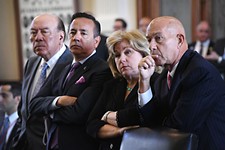Lege Roundup
Fri., March 18, 2005
• Despite anti-gambling activists' best efforts, industry lobbyists are keeping the gaming issue very much alive in the Lege. Last week, Sen. Ken Armbrister, D-Victoria, added his bill to a growing number of proposals to generate new revenue through expanded gaming options. Framed as property tax-relief legislation, SB 1326 would authorize counties to set elections on the question of creating county districts for slot machine operations. Armbrister's bill calls for revenues to go toward reducing property taxes or toward local health care needs, water infrastructure, and transportation. Like others who have filed gambling-related legislation, Armbrister has received political contributions from gambling interests. According to state Ethics Commission records, campaign donations made to Armbrister late last year included $2,500 each from the Alabama-Coushatta Tribe of Texas and the Kickapoo Indians for Democracy, and $7,500 from Big City Capital, a Nevada-based concern run by Billy Bob Barnett, founder of Billy Bob's Texas in Fort Worth. Meanwhile, a new nonprofit – Let the Voters Decide – has formed to help take the heat off lawmakers who support gambling, but don't want to vote for it. – Amy Smith
• Sen. Jeff Wentworth, R-San Antonio, is doing Democrats the favor of taking the lead on a bill that would place redistricting matters in the hands of an outside citizen panel. The group would include an equal number of Democrats and Republicans, though it's uncertain whether the GOP leadership would support that aspect of the plan. – A.S.
• On March 9, Rep. Harold Dutton, D-Houston, joined by Rep. Suzanna Hupp, R-Lampasas, and Sen. Juan Hinojosa, D-Mission, filed companion bills (HB 2418 and SB 1195) that seek to ban law enforcement use of the so-called "consent search" during traffic stops. Consent searches occur when an officer lacks probable cause or any other legal justification to conduct a vehicle search, but still asks the driver's permission to do so. Critics of the practice argue that the discretionary power is linked to racial profiling. A statewide review of data from more than 1,000 law enforcement agencies conducted by Austin-based Steward Research Group revealed that three out of five law enforcement agencies statewide reported asking black and Hispanic motorists for consent to search at rates far higher than they did for white motorists, yet without a correspondingly higher rate of contraband seizures. So far, four states – Hawaii, Minnesota, Rhode Island, and New Jersey – and the California Highway Patrol have banned the practice. – Jordan Smith
• The Senate Finance Committee voted March 9 to accept an amendment to the state Appropriations Bill (SB 1) authored by Sen. Tommy Williams, R-The Woodlands, which would divert $5 million in funding from the state's Family Planning Program for low-income women to unspecified nonprofits that offer women "alternatives to abortion." That means giving state funding to right-to-life crisis pregnancy centers, says Peggy Romberg, CEO of the Women's Health and Family Planning Association of Texas. Unfortunately, the centers are not licensed or regulated, nor do they actually offer any medical services. Currently, the funding is dispersed among 100 licensed medical providers – including the city of Austin, Planned Parenthood, and various medical schools. If the rider survives, it would leave at least 16,000 low-income women without any reproductive health care – including annual physical exams, and screenings for breast and cervical cancers and sexually transmitted diseases. "There is no excuse for taking money out of women's health care" and handing it over to "anti-choice" counselors, Romberg said. "What this is going to do is leave women without health care, which is going to lead to unintended pregnancies – and some of them will be aborted." – J.S.
• Proponents of publicly funding vouchers to pay private school tuition tend to promote their plans as a nice way to help poor students trapped in underperforming public schools. Take HB 12 by Rep. Frank Corte – it funds a voucher pilot program in the six largest school districts in the state, but only students at low-performing schools would be eligible for vouchers of up to $6,400. Limiting the program to students at "failing" schools sidesteps the unpleasant question of whether the real agenda of voucher proponents is to do away with public schools entirely, as many in the education community fear. But with HB 3042, Rep. Debbie Riddle cuts to the chase – she wants the state to pay private school tuition up to $5,500 a year for all Texas students, no matter their families' incomes. She says her plan would save the state $1,000 a year for each student who takes advantage of the vouchers, plus the competition would make every school work harder and educate the children better. "So the state saves money, student performance increases, and the low-performing schools see their ratings in-crease," Riddle said in a statement. "School choice really is the most efficient way to improve all aspects of our education system." Apparently she hasn't heard that students in regular public schools are currently outperforming charter schools – the state's existing experiment in school choice – on standardized tests. – Rachel Proctor May
Got something to say on the subject? Send a letter to the editor.








